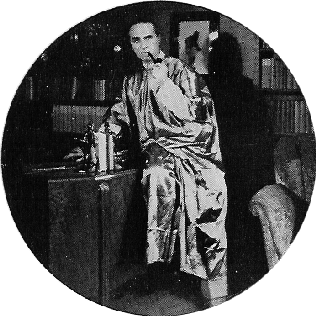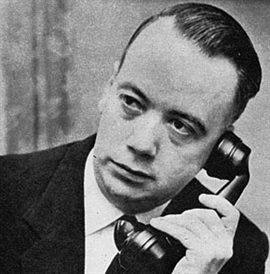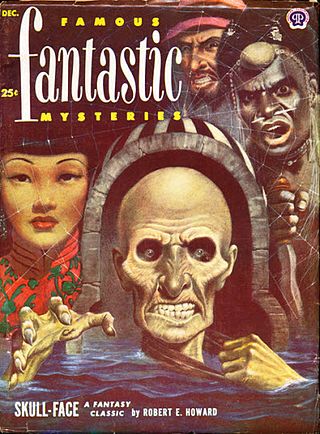
The Collier Hour, also known as Collier's Radio Hour, broadcast on the NBC Blue Network from 1927 to 1932, [1] was radio's first major dramatic anthology.

The Collier Hour, also known as Collier's Radio Hour, broadcast on the NBC Blue Network from 1927 to 1932, [1] was radio's first major dramatic anthology.

The Collier Hour offered adaptations of stories and serials from Collier's magazine in a calculated move to increase subscriptions and compete with The Saturday Evening Post . Airing on the Wednesday prior to each week's distribution of the magazine, the program soon moved to 8:15pm on Sundays in order to avoid spoilers with dramatizations of stories simultaneously appearing in the magazine.
Story segments during the hour-long program were introduced by a host known as the Editor (portrayed by John B. Kennedy, Jack Arthur, Phil Barrison and Arthur Hughes). Directed by Colonel Thomas Davis, the series was created and produced by Malcolm LaPrade (1892 -1974) with music under the supervision of his brother, Ernest LaPrade (1889-1969), who also conducted for the Orchestra of the Nation series.
Three Sax Rohmer serials from the magazine were broadcast, each in 12 weekly parts: The Day the World Ended aired on Wednesdays from May 1, 1929 to July 17, 1929. Daughter of Fu Manchu was heard on Sundays from March 9, 1930 to May 25. 1930 with Arthur Hughes as Dr. Fu Manchu. Sax Rohmer introduced Yu'an Hee See Laughs, serialized on Sundays from March 1, 1931 to May 17, 1931. [2]
In 1929, the format was altered and The Collier Hour became a variety show, offering music, news, sports and comedy in addition to the dramatizations. Helen Hayes appeared on the show October 5, 1930. Guests on the series included George M. Cohan (in his radio debut), John D. Rockefeller, Franklin D. Roosevelt, and Helen Keller.
When Robert Ripley's 1930 debut on The Collier Hour brought a strong listener reaction, he was given a Monday night NBC series beginning April 14, 1930, followed by a 1931–32 series airing twice a week.
William Adams played Uncle Henry, 1926–32. [3]

Dr. Fu Manchu is a supervillain who was introduced in a series of novels by the English author Sax Rohmer beginning shortly before World War I and continuing for another forty years. The character featured in cinema, television, radio, comic strips and comic books for over 100 years, and he has also become an archetype of the evil criminal genius and mad scientist, while lending his name to the Fu Manchu moustache.

Arthur Henry "Sarsfield" Ward, better known as Sax Rohmer, was an English novelist. He is best remembered for his series of novels featuring the master criminal Fu Manchu.

Collier's was an American general interest magazine founded in 1888 by Peter Fenelon Collier. It was launched as Collier's Once a Week, then renamed in 1895 as Collier's Weekly: An Illustrated Journal, shortened in 1905 to Collier's: The National Weekly and eventually to simply Collier's. The magazine ceased publication with the issue dated the week ending January 4, 1957, although a brief, failed attempt was made to revive the Collier's name with a new magazine in 2012.

The Mask of Fu Manchu is a 1932 American pre-Code film directed by Charles Brabin. Written by Irene Kuhn, Edgar Allan Woolf and John Willard, it was based on the 1932 novel of the same name by Sax Rohmer. The film, featuring Boris Karloff as Fu Manchu and Myrna Loy as his daughter, revolves around Fu Manchu's quest for the golden sword and mask of Genghis Khan. Lewis Stone played his nemesis.
Arthur Hughes was an American actor on the stage, radio and films. On Broadway, he performed in two dozen plays between 1923 and 1968, including Mourning Becomes Electra (1931–32) and Elizabeth the Queen (1930–31). On television he appeared in The DuPont Show of the Week and Playhouse 90.

A Fu Manchu moustache or simply Fu Manchu, is a full, straight moustache extending from under the nose past the corners of the mouth and growing downward past the clean-shaven lips and chin in two tapered "tendrils", often extending past the jawline. An expansion of the Fu Manchu sometimes includes a third long "tendril" descending from a small patch on the chin.
Denis Nayland Smith is a character who was introduced in the series of novels Dr. Fu Manchu by the English author Sax Rohmer. He is a rival to the villain Dr. Fu Manchu.

Harry Alan Towers was a British radio and independent film producer and screenwriter. He wrote numerous screenplays for the films he produced, often under the pseudonym Peter Welbeck. He produced over 80 feature films and continued to write and produce well into his eighties. Towers was married to the actress Maria Rohm, who appeared in many of his films.

The Mysterious Dr. Fu Manchu is a 1929 American pre-Code drama film directed by Rowland V. Lee and starring Warner Oland as Dr. Fu Manchu. It was the first Fu Manchu film of the talkie era. Since this was during the transition period to sound, a silent version was also released in the United States, although only the sound version exists today. The film's copyright was renewed.
The Crime Club was an imprint of the Doubleday publishing company, which later spawned a 1946-47 anthology radio series, and a 1937-1939 film series.

Detective Story Magazine was an American magazine published by Street & Smith from October 15, 1915, to summer 1949. It was one of the first pulp magazines devoted to detective fiction and consisted of short stories and serials. While the publication was the publishing house's first detective-fiction pulp magazine in a format resembling a modern paperback, Street & Smith had only recently ceased publication of the dime-novel series Nick Carter Weekly, which concerned the adventures of a young detective.

Fah Lo Suee is a character who was introduced in the series of novels Dr. Fu Manchu by the English author Sax Rohmer (1883-1959). She is the daughter of Dr. Fu Manchu and an unnamed Russian woman, sometimes shown as an ally, sometimes shown as a rival. The character featured in cinema and comic strips and comic books alongside her father, sometimes using another names, and she has also become an archetype of the Dragon Lady.
The Adventures of Dr. Fu Manchu is a syndicated American television series that aired in 1956. The show was produced by Hollywood Television Service, a subsidiary of Republic Pictures.

The Return of Dr. Fu Manchu is a 1930 American pre-Code film directed by Rowland V. Lee. It is the second of three films starring Warner Oland as the fiendish Fu Manchu, who returns from apparent death in the previous film, The Mysterious Dr. Fu Manchu (1929), to seek revenge on those he holds responsible for the death of his wife and child.

Skull-Face is a fantasy novella by American writer Robert E. Howard, which appeared as a serial in Weird Tales magazine, beginning in October 1929, and ending in December, 1929. The story stars a character called Stephen Costigan but this is not Howard's recurring character, Sailor Steve Costigan. The story is clearly influenced by Sax Rohmer's opus Fu Manchu but substitutes the main Asian villain with a resuscitated Atlantean necromancer sitting at the center of a web of crime and intrigue meant to end White/Western world domination with the help of Asian/Brown/African peoples and to re-instate surviving Atlanteans as the new ruling elite.
Sumuru is a female supervillain created by Sax Rohmer, author of the Fu Manchu series of novels. She first appeared in a 1945-1946 BBC radio serial, which was rewritten as a novel in 1950. Four more novels were published between 1951 and 1956. Two movies were then made in the 1960s and one more in 2003.
The Yellow Claw is a 1921 British silent crime film directed by René Plaissetty and starring Sydney Seaward, Arthur M. Cullin and Harvey Braban. The film was shot partly at Cricklewood Studios and ran 68 minutes. It was based on the 1915 novel The Yellow Claw by Sax Rohmer, in which a French detective battles a notorious master criminal named Mr. King.
"Sax Rohmer #1" is the first track on the Mountain Goats' Heretic Pride album released in 2008 on 4AD.
The Adventures of Sherlock Holmes is an American old-time radio show that aired on US radio networks between 1930 and 1936. The series was adapted from Sir Arthur Conan Doyle's Sherlock Holmes stories by scriptwriter Edith Meiser. For most of the series, Richard Gordon played Sherlock Holmes and Leigh Lovell played Dr. Watson.